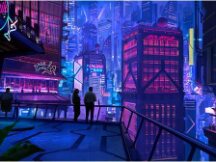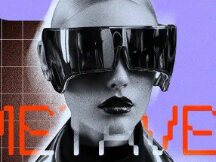Researching the Integrity of Life and Death in the Age of Virtual Digital People in the Metaverse
Death is not the suffering of the dead, but the suffering of the living
- Epicurus
In 2022, as the metaverse concept has become popular, virtual digital humans have also caught the public eye. With the use of the "Virtual Digital Human Deep Industry Report", digital individuals are available in the non-physical world created and used by computer graphics, graphics rendering, motion capture, deep learning, speech synthesis and other computer resources. There are many different combinations of human characteristics (like traits, human activities, human relationships, etc.).
The high degree of similarity to humans is an important characteristic of digital digital humans, and compared to previous virtual idols, virtual digital humans in Metaverse not only look like humans, but also support activities such as capturing and in-depth training. education. , a good virtual digital operator can reach false levels.
So can we use the metaverse and virtual digital human technology to eliminate life and death issues and bring death to our loved ones? This seems possible by consensus. Right now,What does it mean to live and die for us?

1. Count life and death
Modern Chinese culture has a long history of Confucianism, Buddhism, and Taoism, and our thoughts and feelings about life and death have always been influenced by our thoughts and practices. Usually, no matter which country, country or culture presents the worst case scenario of death, it is still not permissible to refer to death in words or documents.
Chinese Confucian culture is the most resistant to death. Confucianism is humanBe kind to yourself", and considered death an unfortunate event. On the one hand, Confucius used the word "unfortunate" to refer to Yanyuan's death incessantly in "Confucius' Analects, Yongye", and wept bitterly for her, worried to lose 'blood' Yeon-won's life was too short,It is a pity that Confucius does not know his plan well.
Taoism, the indigenous religion of our country, is still an integral part of Chinese culture and influences our way of thinking about life and death. Wang Fangfang, a professor at Peking University Medical School, believes that Taoism includes two dreams: the dream of immortality and the dream of a soldier. Both have the invisible concept of death, and "immortality" according to the concept of immortality always respects human beings as bodies and protects against death.
But Taoism has a dead side to death. When Zhuangzi's wife died, he sang and sang, but the comedians looked at her as if her attitude towards death wasn't pure enough. And Zhuangzi's "Xiaoaoyou" is really a death story. Lao-tzu's death is a myth, and it is said that Lao-tzu disappeared into the yellow dust after passing the Hangu Pass.
Therefore, the Chinese view of life and death has two extremes. both "Everything dies while they live, everything dies as they are, and filial piety is the end."The attitude of death is used to indicate the uselessness of life. In "Hai Nanji", there is also an impact on Dayu's flood control, which Dayu shouted from a bow inches from his ship, ignoring the threat of the king's dragon.life and death. "It was tough and brave.

2. Virtual digital human going through life and death
Now, as technologies such as holographic projection, deep study, capture and AR/VR have become more mature, recreating the status quo of some dead stars is no longer a slight problem. A classic song called the same scene as the popular star. Digital virtual reality brings more and more people, objects and things that are stored in our memory, as if the past reappears.
Virtual digital users have many uses and may have other uses besides their application in games, entertainment and other activities. In theory, we can "repeat" people who have gone through tools such as virtual reality, as long as we can get sufficient and accurate information. Let's cross paths of life and death and meet people we will never forget.
In the movie "Like You" produced by MBC in Korea, experts released Nayan, a 7-year-old girl, using VR technology. The real daughter died of leukemia A few years ago, her mother Zhicheng was still on the move, and her best wish was to see her daughter die again.



Of course, not everything is easy, but first you need to collect a lot of information from your team. The expert team collected multiple images of Nayan's life based on the app, and then recreated "Nayan's" digital virtual machine from the metaverse based on Nayan's face. After that, the expert team had to remove Nayan's voice from previous films and other image files to keep Nayan "live" in the transition as much as possible and know his mother's long-term needs. . Zhicheng for many years.
When everything was ready and Nayan came out of the grass in his bare shirt and exclaimed, "Mommy, I'm here, mommy, do you remember me?" Mom was crying when she ran to Zhicheng. “Yes, I miss you so much!


In the metaverse position, Nayan is so real that even a lock of hair is blown out, showing different microscopic expressions in various senses such as joy and sadness. An immersion that virtual digital people can create.


Nayan, a virtual metaverse location called paradise, has toys, candy, and slides, and Nayan even invites his mother Ji-chung to his birthday party. After singing the birthday song, Jisung handed the 8th cake candle to Nayeon. Nayan celebrates his birthday. I want my dad to quit smoking, my siblings not to argue and my mother not to cry.

After everything was done, Nayan turned into a butterfly and flew away as her mother Zhicheng looked on. "I love you so much. But Nayan, don't think about you and I will visit you where you are. From this day forward, we will spend every day happy."


Finally, Ms. Zhicheng said that it was a valuable experience for her. , this meeting is a very happy moment. He hopes that those who have lost their families and children like him can step out of the past and receive a new life like his.
3. Conflict between technology and ethics
Is a digital person a digital device of the deceased or a "resurrected" person in some form? As the learning of AI deepens and the development of the intelligence era arrives, these digital users will have a special meaning for their relatives and friends who have been deeply saddened, regarded as "me- same". This can raise questions of justice and equity that really need to be resolved.
Digital virtual people can violate the rights of the deceased
Although the Constitution states that the jurisdiction of civil rights ends with death, the significant difference between one person and another is that people have different thoughts, feelings and thoughts, and the evaluation of relationships and the creation special effects also exist objectively.
According to current law in Korea, the law for the protection and interests of the deceased are divided into two groups. One is the protection of the dead as defined in section 994 of the Constitution. (If the name, image, title, dignity, privacy, ashes, etc. of the deceased are violated, the spouse, children and parents have the right to detain an offender according to law, s 'they are unmarried or unmarried.) Children and parents have the right to hold the author responsible under the law for the death of the deceased and other close relatives), one is to protect the moral rights of the author under sections 22 and 23 of the Privacy Act. .
According to "civil law", the deceased prefers personal legal protection and these special privileges are protected by his or her spouse, children, parents or other relatives, but the law does not allow the death of a parent, a spouse or a child. nearby canto punish,sivTheir portraits, cuts, etc. are used for other purposes. The general idea of the community is that the relatives of the deceased have certain rights in connection with the "death" of the deceased.
However, even though it includes the right to create a virtual digital character, it's incredibly legit. The backbone is the best way to create a digital identity, and the personal preferences and dignity of the deceased are violated in human life.
Additionally, after the creation of the Virtual Digital Human of the Dead, the actions and words of the Dead can no longer be determined by "people", and the functions of the Virtual Digital Human are only controlled by the Residents. We can use technology to bring the dead back to mourning, but do you also want to bring them back to digital life? Who controls their words and actions? Do you manage to engage in behaviors or conversations that you don't approve of throughout your life? These are questions that need to be made serious.
According to moral and ethical standards, digital resurrection is a crime against the dead. Moreover, not so long ago, a presenter reported the ashes of her loved ones on the Internet, attracting the likes and dislikes of critics. What we have to consider is that the virtual digital version of the deceased could be used for malicious purposes.This is not only disrespectful to the dead, but also a violation of the civil and cultural norms of the community.

Virtual digital people have a negative impact on your life.
Death is the end of our long life through misery, the end that all life will inevitably face, irreversible, irresistible, uncompromising. How do we view death? Confucius says "Not knowing how to live, knowing death."Therefore, we want a wonderful and transformed life for peace, we cannot understand the meaning of death until we are truly alive and reach the end of life. So death must be good in the eyes of the living...
The dead are a tragedy and a failure of life, and it is our desire to make this regret. So, at a time when technology is not yet advanced, we have created a series of festivals, customs and traditional ceremonies to remember and remember the dead.
One of the purposes of mourning is to live without sorrow or grief, and mourning the dead will gradually become an unconscious and a driving force to guide the good life.You will learn to let go of death because you deeply understand that one day the dead will be reunited.
Thus, the author opposes the creation of a digital version of the dead, despite the prospect of mourning. Digital virtual humans are so real that they can interact with living beings to a certain extent, which in the long term can disturb the life of the uncertainties of life and death lines and create the despair of fraud. The future should be good.If death can't force us out of our bonds, how many of us can start and leave our bonds?

finally write
In Acts and Times, Heidegger is said to "live in death", which he believes to be living in death unless one dies. We can fight with all our might, but "death is like queuing, you can't line up, you can't ask for your back".
How to take it is the last point we should all think about. Moreover, a virtual digital person who has been converted into the digital world as a metaverse is not the answer to death, but the embodiment of the obsession with the living. Do not despair before the final test and live in peace forever.After all, what we live to be afraid of is not really living.

Scan QR code with WeChat






























